Fennel is a plant with a distinct flavor that has been used in a variety of cuisines across the world. It is a flowering plant belonging to the carrot family. Fennel has a pungent scent that some people dislike, although it is edible to guinea pigs.
This herb is an excellent choice for the guinea pig diet since it contains a variety of minerals, including vitamin C, and moderate levels of fat, oxalates, and phosphorus. However, do not feed them the seeds as it may choke them.
Table of Content
Is Fennel Good for Guinea Pigs? | Health Benefits
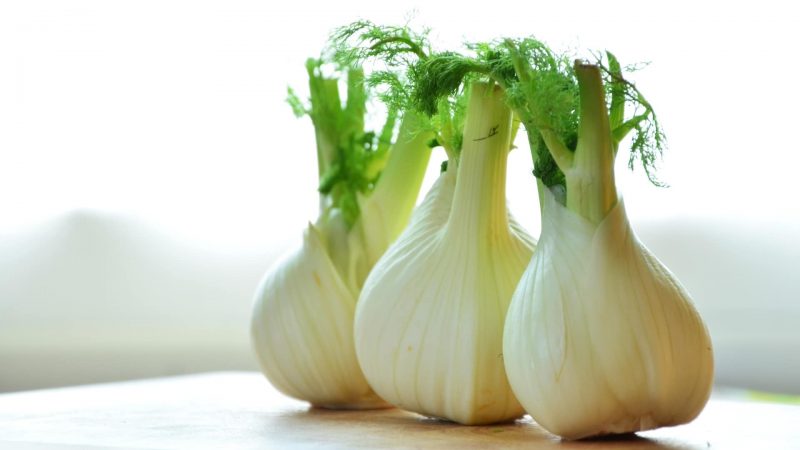
Vegetables usually have so many benefits, so they are considered a healthier option for guinea pigs than fruits. Fennel isn’t any different from the other herbs and veggies. It has a vast number of benefits such as:
- This herb has anti-clotting properties that reduce the risk of hypertension and have been known to help prevent heart attack too. Extracts of this herb can be used to lower blood sugar and therefore control diabetes.
- This plant has mineral and vitamin content that will ensure the guinea pigs will develop healthy bones. Fennel helps with this process by improving blood circulation to the body’s bones and muscles, ultimately enhancing bone growth.
- Most of the nutrients found in fennel are actually antioxidants. Antioxidants neutralize free radicals in our body that cause damage to cells.
- Fennel is an excellent source of dietary fiber. This helps to ease digestion processes and even promotes natural bowel movement.
- Choline which is readily found in fennel aids in the reduction and prevention of inflammation.
- When you feed your guinea pig sufficient amounts of fennel, it will feel full most of the time, and this will limit the amount of food that it can take in. Fennel can be an ideal weight loss option for your guinea pig.
- Fennel helps to increase iron absorption.
Nutrition Facts of Fennel for Guinea Pigs
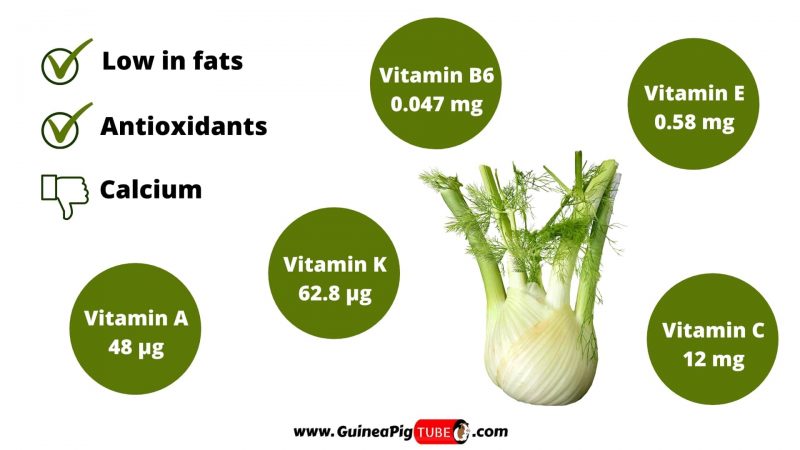
Fennel is a potent nutrient plant and it is rich in various nutrients. Per 100 g these are the nutrition facts:
- Energy – 31 kcal
- Protein – 1.24 g
- Total lipid (fat) – 0.2 g
- Carbs – 7.3 g
- Dietary fiber – 3.1 g
- Sugars – 3.93 g
- Calcium – 49 mg
- Iron – 0.73 mg
- Magnesium – 17 mg
- Phosphorus – 50 mg
- Potassium – 414 mg
- Sodium – 52 mg
- Zinc – 0.2 mg
- Copper – 0.066 mg
- Selenium – 0.7 µg
- Vitamin C – 12 mg
- Vitamin E – 0.58 mg
- Vitamin K – 62.8 µg
- Vitamin A – 48 µg
- Vitamin B-6 – 0.047 mg
- Thiamin – 0.01 mg
- Riboflavin – 0.032 mg
- Niacin – 0.64 mg
- Folates – 27 µg
- Carotene, beta – 578 µg
- Lutein + zeaxanthin – 607 µg
Can Fennel Be Bad for Guinea Pigs? | Possible Risks
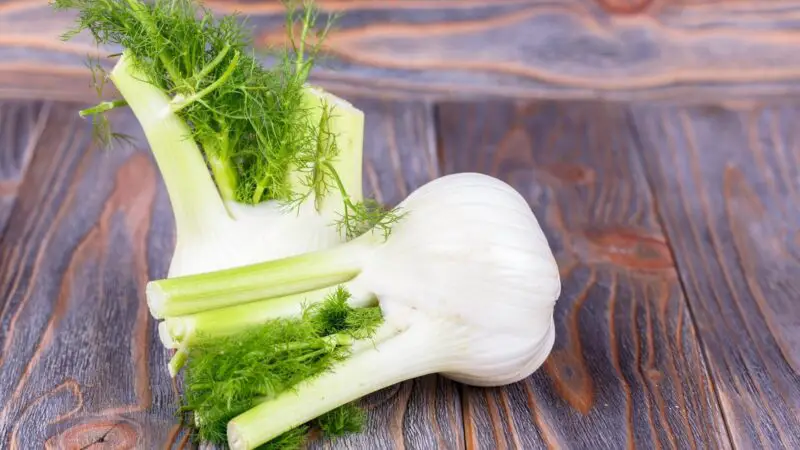
There are some risks associated with fennel. Most of them are controllable, and all you need to do is to regulate the intake of fennel in the guinea pig’s diet.
In case you notice any form of allergy, maybe a change in behavior of the guinea pig, you should stop feeding it right away. As first aid, you can offer them plenty of water and wait.
Too much calcium can lead to kidney stones in guinea pigs. This is why you need to regulate the amount of fennel that you give to your guinea pig. If your guinea pig has kidney stones, it will typically produce an excessive amount of urine. Other signs that your pet may be developing kidney stones include difficulty urinating, difficulty controlling urine flow, or bloody urine.
If you notice these signs in your pet, contact a qualified veterinarian to determine the severity of your animal’s condition and if further treatment is necessary for recovery from kidney stones.
Serving Size and Frequency of Fennel for Guinea Pigs
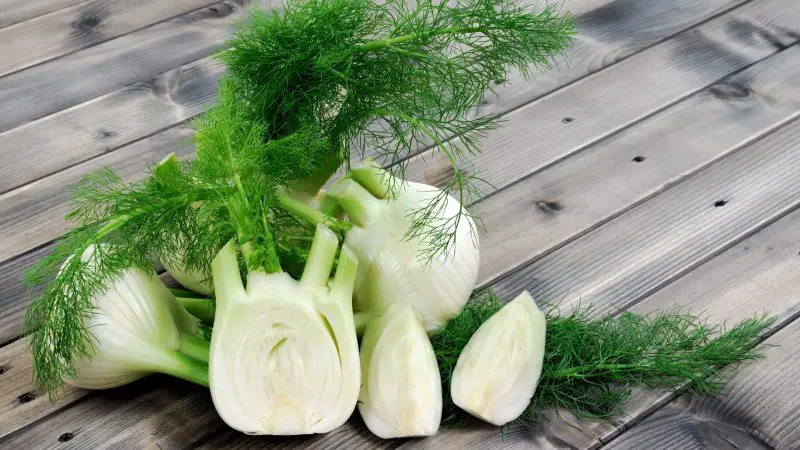
Can Guinea Pigs Have Fennel Every Day?
Guinea pigs have a hard time digesting fibers, which can cause them to get diarrhea. When guinea pigs eat too much of the fennel, it can lead to malnourishment. Guinea pigs should not eat fennel every day but they’re able to get some extra nutrition from eating small amounts of it on some occasions.
For starters, 2 to 3 times a week isn’t a bad option. It would be more than enough for guinea pigs. There are also many other vegetables that you can feed to your guinea pigs during the week, such as basil, arugula, beetroot, cauliflower, endive, and many others.
Can Guinea Pigs Eat the Whole Fennel?
Guinea pigs should not eat the entire fennel. Some parts of a fennel plant might be too strong for guinea pigs to handle.
When you’re giving your pet guinea pigs fennel, limit it to about an eighth of a cup per day, approximately 2-3 pieces of fennel for one guinea pig. You shouldn’t give your guinea pig more than a few green leaves from this plant per day.
More Information About Guinea Pigs and Fennel
In this section, you will find more about what part of the fennel can guinea pigs eat. Let’s see!
Can Guinea Pigs Eat Fennel Leaves or Fennel Fronds?
Guinea pigs can eat fennel leaves or fennel fronds but they should only be given in limited amounts. If eaten in moderation, they will not experience health issues. Fennel is a very high-fiber herb and will give your guinea pig diarrhea if your pet overdoses on fennel leaves.
Can Guinea Pigs Eat Fennel Bulb?
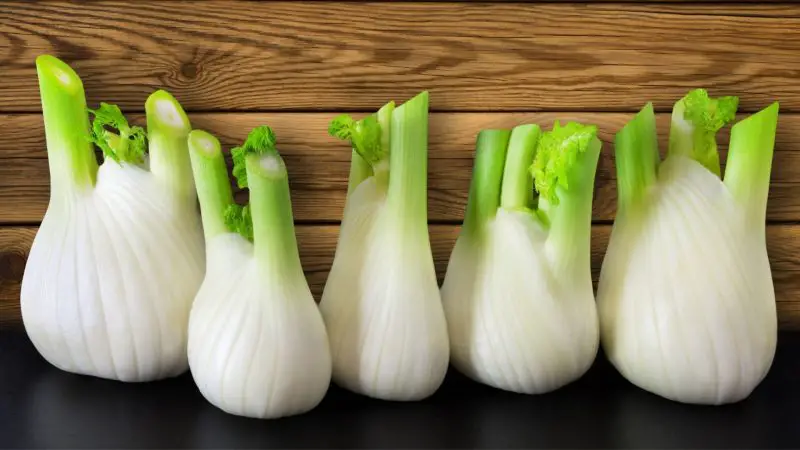
Fennel bulb is safe for guinea pigs, and guinea pigs can eat fennel bulbs in small quantities. This bulb may be toxic to guinea pigs if eaten in large quantities. Potential side effects from eating too much fennel bulb include diarrhea, abdominal pain, nausea, and vomiting.
But, in normal amounts, it is a good option for their health, as it can boost their immunity significantly. Fennel bulbs can provide many great nutrients for these little pets. The best way to feed them this part is to cut it into small pieces.
Can Guinea Pigs Eat Fennel Seeds?
Unfortunately, guinea pigs do not eat seeds, as they can be a potential choking hazard to them.
Can Guinea Pigs Eat Wild Fennel?
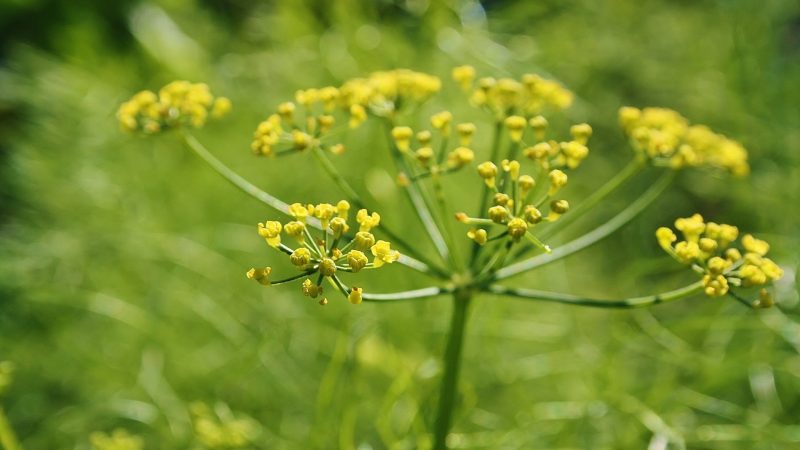
Guinea pigs can eat wild fennel, but this fennel should be given to a guinea pig in moderation as it can be very toxic in large amounts. However, it is important to note that some guinea pigs may be allergic or sensitive to wild fennel. If they’re eating it with no problem at first and then suddenly start displaying signs of allergy, then the chances are that the wild fennel has caused it.
Quick Facts on Fennel
- In the whole world, India leads in the production of fennel.
- The plant is perennial and can last more than two years.
- A sugar-coated seed of the fennel plant is chewed in India and Pakistan to eliminate bad breath and ease digestion.
- The leaves of the fennel plant have a stronger taste than the bulb.
- The plant propagates through seeds.
- Fennel is a flowering plant from the carrot family.
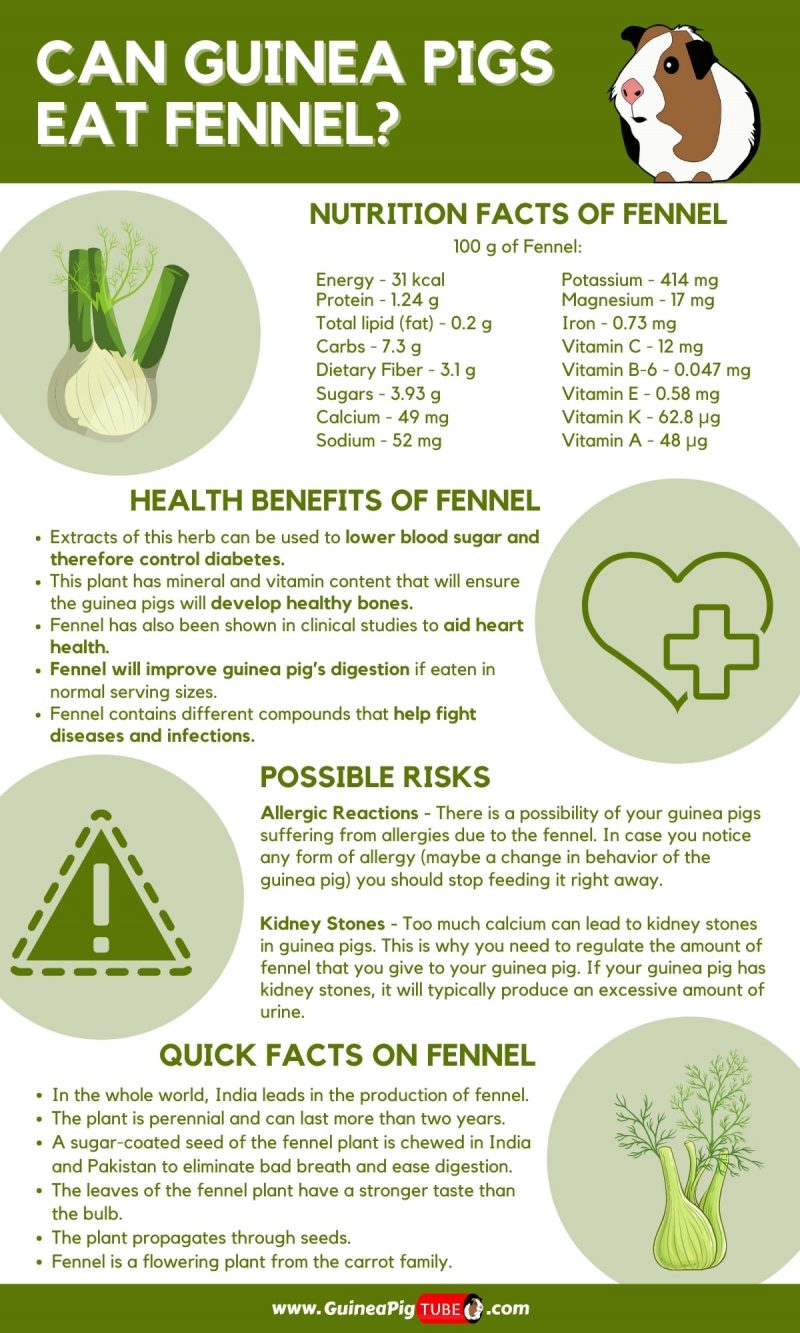
We have also made a full list of foods that guinea pigs can and can’t eat (150+ Types of Foods). Be sure to also check our recommended products page for everything you will ever need to assure a happy life for your guinea pigs. Hope this information was helpful and you have found the answer you were looking for.
List of Sources
Nutrient Requirements of Laboratory Animals: Fourth Revised Edition
The Effects of Diet on Anatomy, Physiology and Health in the Guinea Pig
